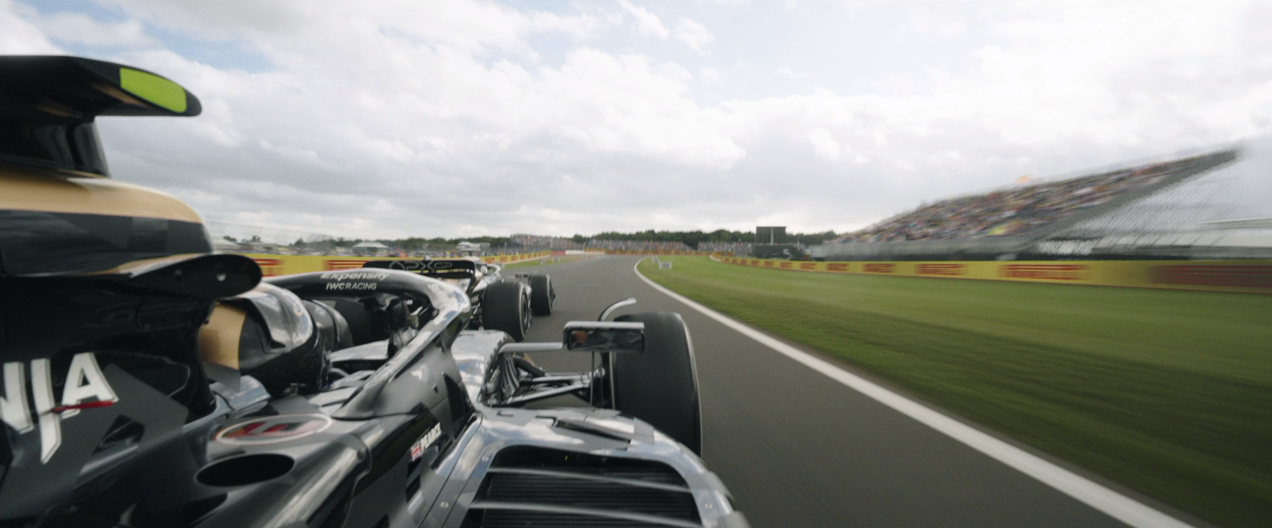F1
Slow is smooth and smooth is fast, the old saying goes. Joseph Kosinski’s F1 is incredibly smooth, as well oiled a professional piece of filmmaking as you will find, a modern day Days of Thunder shorn of all rough edges so that it can cut through the air like a knife. In the process it sometimes cuts through logic, originality or characterization but it’s infuriatingly entertaining it’s easy to ignore how straightforwardly uninterested its screenplay is in human beings. That’s not what anyone is really here for; they’re here for Formula One cars sliding around tracks at 200mph and Brad Pitt’s movie star charisma, neither of which have anything to do with being human. But given the right place and the right context, they’re just about the only thing that matters.
It’s much the same for Sonny Hayes (Pitt), an itinerant race car driver who only seems to make any sort of sense behind a steering wheel. Moving from track to track as hired gun for anyone who needs a killer, Sonny barely speaks to regular people or understand what makes them tick – probably because he barely understands himself. But once behind the wheel of a car, or arguing with another driver, and all questions and concerns fall away as embraces something he does understand. After years of drifting he finally gets to put that talent to the test when his old teammate (Bardem), now Formula One team owner, asks him to do the impossible: lift the worst team in the division from last place, past the best drivers in the world, and win at least one Formula One Grand Prix.
And in the process, translate the thrilling speed of the race into a cinematic spectacle in a way film has seldom captured. That’s a tall order, for Sonny and for the filmmakers.
Frankenheimer’s Grand Prix has rightly been hailed for decades as the definitive car race film. The way it put cameras, and through them the audience, down into the point of view of the cars racing along the tarmac amongst stark cutting created a unique view of speed that quickly became part of the car chase lexicon, lending power to its melodramatic elements. Kosinki’s approach is not any different, just smoother, taking all of the tools of the last 60 years to bring us more into the middle of the race than ever before. He realizes, as Frankenheimer once did, that the human beings don’t matter because the creates the audience wants to be are the metal beasts careening around the tarmac within inches of one another, always risking disaster. The personal trials of Sonny to win one last race or rookie Joshua Pearce (Idris) to live up to his potential pale in comparison to that, which is why it’s perfectly fine that they are as thin as paper or lacking any sort of emotional connection.
What it lacks in interesting storylines (the patchwork framework of F1 is the desiccated corpse of every sports movie to date pinned together with tropes and the kind of dialogue that survives through studio development) it makes up for in pure charisma, both from the cars and from Pitt’s old fashioned movie star mastery. F1 is the kind of film made for a Hollywood star to sit in a car, look cool and charm his way through scenes. That’s not a bug, it’s a feature; it was done that way for so long because it works, even if we’ve forgotten. It worked then and it works now. No, F1 doesn’t have a core of internal drama or character realization adding to the onscreen fireworks the way Kosinski’s superior Top Gun: Maverick did. It has a Formula One driver who lives in a Volkswagen Minibus and has a gambling problem, and for a film like F1 it really doesn’t need anything more.
The genius of F1 lies not in what it aspires to be, but in what it refuses to pretend it isn't; it is here to deliver one specific experience: the vicarious thrill of speed, danger, and effortless cool. Kosinski understands that sometimes the most honest thing a film can do is embrace its own superficiality, to polish that surface until it becomes a mirror that reflects our desire to be somewhere else, someone else, moving faster than humanly possible. In an era where blockbusters often buckle under the weight of their own self-importance, F1 succeeds by staying in its lane, never apologizing for being exactly the kind of star vehicle that Hollywood used to build with confidence. It's a machine built for pleasure, nothing more and nothing less, and like the best machines, it does exactly what it was designed to do.
7.5/10
Starring Brad Pitt, Damson Idris, Kerry Condon, Javier Bardem, Tobias Menzies, Kim Bodnia, Sarah Niles and Will Merrick. Directed by Joseph Kosinski.




